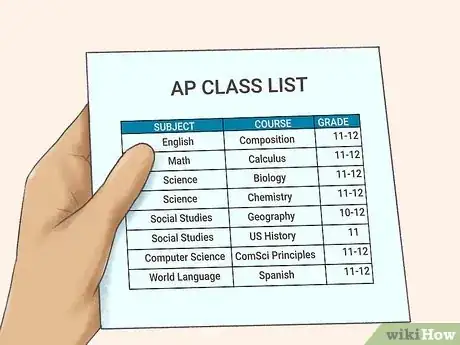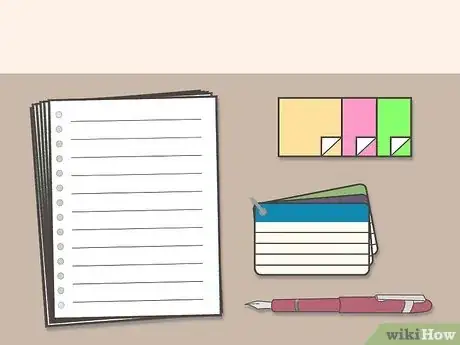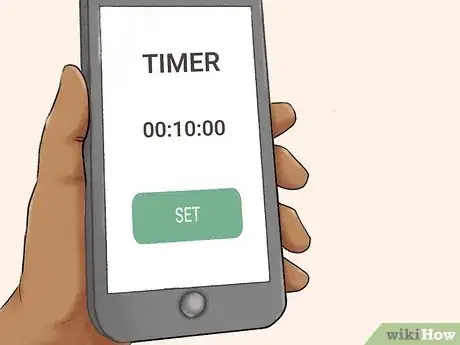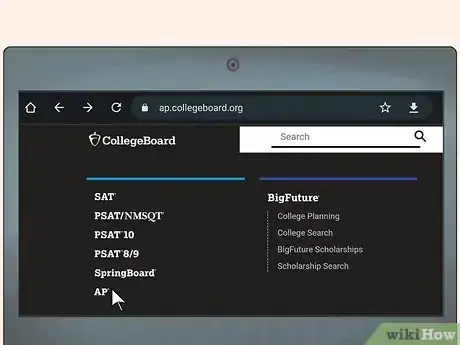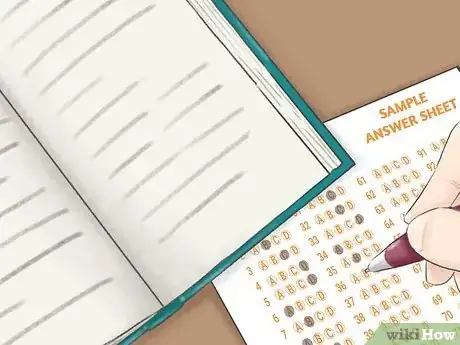This article was co-authored by Jai Flicker. Jai Flicker is an Academic Tutor and the CEO and Founder of Lifeworks Learning Center, a San Francisco Bay Area-based business focused on providing tutoring, parental support, test preparation, college essay writing help, and psychoeducational evaluations to help students transform their attitude toward learning. Jai has over 20 years of experience in the education management industry. He holds a BA in Philosophy from the University of California, San Diego.
There are 9 references cited in this article, which can be found at the bottom of the page.
This article has been viewed 50,637 times.
Taking one AP class is challenging enough, but if you've signed up to take several this upcoming school year, it's going to be even tougher. Be prepared for extra work, developing good time management, and to learn more than you would in any other high school class.
Steps
Before the School Year
-
1Pick the AP classes right for you. Don't take a bunch of AP classes in subjects you really hate, or ones you really struggle in. You can pick one that really challenges you, but make sure then that the other classes (including electives and non-AP's) are manageable. If you're good at math and science, but not foreign language or English, take a math and/or science, and just one in a subject that's harder for you.[1] [2]
-
2Make sure you get all the summer assignments and textbooks before the end of the year. Most AP classes have summer homework because there's so much more content to cover in a year than other high school classes.[5]
- Summer homework is also great to brush up on content that you might have learned in an early prerequisite class. For example, most people take Chemistry I before AP Chemistry, so it's good to have a solid foundation on what you've already learned before diving into harder stuff.
- Don't be overwhelmed by the summer homework! It might look like a lot, but if you have a good AP teacher then the homework is very helpful and necessary.
Advertisement -
3Don't procrastinate on your summer homework! You may also have some summer reading and a bit of other work to do, as well as having fun (it's summer of course!), but you don't want to be cramming everything a week before the school year starts.[6]
- Review what work you have to do before the school year ends and plan out when you will do it and how long you think it will take. Once you break it down, it will probably look less intimidating.
- Mix up work and play. If you're going to lunch and then the beach one day, commit to reading one chapter in the morning before you leave. Spreading work out like this will make your summer actually feel like summer, not homeschool.
-
4Consider buying a prep book for your AP classes. While it does not replace your textbook, they are helpful for last minute reviewing, practicing multiple choice questions, and getting an idea on how the course is organized.[7]
- Barron's, Kaplan, and Princeton Review are a few of the most popular prep books, but some books are better for some subjects than others. Ask around to see which ones may be the best for you and the subjects you're taking.
-
5Be mentally prepared and organized before the year begins. Get all the supplies, including flashcards, lots of loose-leaf paper, and post-it notes. Go shopping for new clothes and try to get excited for a new challenge! Remember that it's only high school, that you can drop a class if you find it to be too much, and to not stress out too much about being a straight-A student. If this is your first time taking APs, or taking multiple, realize there will be an adjustment period, but be ready to adjust quickly![8]
- Don't forget to enjoy your summer! Don't just work, work, work all summer or else you'll get burned out.
During the School Year
-
1Get better time management skills quickly. If you procrastinate a lot, have a very short attention span, start small. Set a timer for 10 minutes with a 5 minute break and spend it with completely undivided attention to your work.[9]
-
2Be flexible with your study techniques. If you're studying for a test and don't do as well as you hoped, don't hesitate to try studying for a different angle!
- Remember to study smart (and hard, but especially smart). With so many hard classes, you have to be efficient with your time and that means making every minute as productive as possible.
- Create flashcards to review on the bus, during a free period, etc. It doesn't seem like much, but reinforcing info (especially for classes that require memorizing) is important to learning so much in a quick amount of time.
-
3Avoid cramming. While it can work for some people, at least if they pay attention in class, it doesn't keep the information in your head. It's only temporary knowledge, and this is bad in AP classes where the information is often cumulative. If you cram for multiple AP classes, by the time AP exams come you'll be rushing to learn everything all over again because you remember nothing.[10]
- Don't pull all nighters either. If all you do is go to school and come home, then maybe you can get away with it for awhile. But if you're dedicated to other activities, especially sports and active things, you'll really drain yourself. A rare all nighter is understandable, but several times a week is inexcusable.
-
4Use your weekends efficiently as well. The weekend is a great time to relax and actually have a social life, but you need to use this time to get some work done if you don't want to be rushing the whole week.
- Allow yourself to hang out with friends every other weekend (if you have other activities during the week that take up your time).
- Use the time during your extra curricular activities to be with friends, like in clubs and sports. There is a lot of socializing in these activities, even if it's not going to movies or the beach.
-
5Try creating a study group, but pick your study buddies wisely. If you get distracted easily, just pick one study buddy. Make sure this is someone you enjoy being with, but can also focus and get stuff done with. Also make sure that you're all around the same level so that they can teach you something and vice versa. You don't want a study group where you learn nothing.
- Study groups are also helpful for reinforcing things you've already studied. For example, asking and answering questions to review for an upcoming test is more interesting than just shuffling flashcards.
-
6Be efficient while doing homework. AP homework can take 2 hours to finish, and even longer if you're not focusing on it the whole time.
- Vocabulary homework: It helps to use two sources; your textbook, and Quizlet. This is especially true in history classes. Try putting the definition in your own words, because the textbook definition can be long sometimes. For some words, you can put more information so that your definitions don't all look short and copied. For others, use Quizlet because the definitions are usually shorter and more to the point (but put them in your own words!).
- Short answers homework: It helps if you've already read the chapter/taken notes. Go to the page(s) that are related to the question and basically jot it all down (better to type). Once you dump all the information you can reorganize the sentences and words to sound better.
- Math/word problems: Try to see what formulas relate to what information the question gives you. Break the work down so that you don't make mistakes. You can't rush math as well, and doing so may lead to a lower grade and more wasted time trying to fix your mistakes. You can go over your answers that morning or before class starts if you don't have time at home.
- Essays: Decide what you'll talk about in each paragraph and look in your textbook for information that relates to each. Type down all the information. You can spread this out to a chapter a day if that's more convenient. Then go back and make the sentences and words flow better, adding transitions and good vocabulary. Make it concise! Go back into your textbook and double check whether you've missed anything. Get it revised if your teacher takes rough drafts.
Preparing/Taking the AP Exams
-
1Start early. College Board (the company that controls everything AP) usually releases the AP schedule well ahead of time, around February/March, so go on the website and see which exams are first for you and start with those.[11]
- You could cram, at least for one class, for about two weeks, but this will lead to stress and may not be possible if you have stuff to do outside of school. It's much better to spread it out and do a little bit of review every day for a couple of months.
- If you've been struggling with a class all year, start studying for that first. Spread it out to an hour, or even half an hour a day.
- The College Board has posted many AP exam-specific YouTube videos.[12]
- Be selective and watch the ones that are relevant to what you need to learn.[13]
- You can use the speed function on YouTube to speed up the presentation and watch them at 1.5 speed to get through them faster and slow down as needed.[14]
-
2Fill out of the form and hand in the money in time. This is usually due around late March. Tell your parents ahead of time (if they're paying) because AP exams cost a pretty penny--around $95. And with multiple, you could be paying $300 just to take a test! Remember though that this is better than better $1,000 for one class in one semester, which you would be doing in college.[15]
- The price should also motivate you to study harder for the exam. If you don't score high enough, all this work (and money!) won't count as any credit. Even if you took the class just for a challenge, it's pretty upsetting if you don't get some tangible credit for it.
-
3Really start using your prep books now! If you spread out your studying well, you can go over a section a day in the prep book, take the multiple choice, and then review it and what you got wrong the next day.
- It's very important to not just practice multiple choice/free response, but go over what you did wrong and why. If you know why, there's a much lower chance you won't get the answer wrong again, and that's what practice is all about.
- Take at least one practice exam before the actual one. Time goes by quickly taking the exam, and you'd be surprised how hard it is to cram in 70 questions into 50 minutes for some exams (that's less than a minute per question). You will also feel more prepared once you sit down on exam day, and that will calm your nerves.
-
4Sleep well the night before the exam. If you have to still study because of procrastination, don't study for more than an hour. Otherwise, you can flip through some pages on things that you're rougher on, eat a good dinner, shower, lay out your clothes (even if you usually don't), and go to bed early. 8:00 PM is the best time, but it can be 9:00 if it has to be.[16]
-
5Eat a good breakfast that morning, and don't study. Don't look over your notes, don't flip through the prep book. Just wake up at a good time, get ready, eat something with protein, fiber, fruit, and juice or water. Also carry water with you to school. You're not allowed to drink during the exam, but you can drink before, afterwards, and between sections.
- Consider wearing a watch so you can keep track of how well you're doing time-wise.
-
6Go in with a clear mind and the mindset that you've worked hard and are ready for this.
- Pat yourself on the back for a good year and how well you conquered a new challenge. Then look forward to a nice, relaxing summer!
Expert Q&A
-
QuestionHow many AP classes should I take?
 Ted Coopersmith, MBATed Coopersmith is an Academic Tutor for Manhattan Elite Prep, a test prep and academic tutoring company based in New York City. In addition to general academic advising, Ted has expertise in preparing for the ACT, SAT, SSAT, and ASVAB tests. He also has over 30 years of financial controller advising and consulting experience. He holds a BA from the City University of New York (CUNY) and an MBA from Pace University.
Ted Coopersmith, MBATed Coopersmith is an Academic Tutor for Manhattan Elite Prep, a test prep and academic tutoring company based in New York City. In addition to general academic advising, Ted has expertise in preparing for the ACT, SAT, SSAT, and ASVAB tests. He also has over 30 years of financial controller advising and consulting experience. He holds a BA from the City University of New York (CUNY) and an MBA from Pace University.
Academic Tutor Limit the amount of AP classes you take, since by nature they are mentally challenging and often require additional study time and focus.
Limit the amount of AP classes you take, since by nature they are mentally challenging and often require additional study time and focus. -
QuestionHow can students study for the AP courses?
 Jai FlickerJai Flicker is an Academic Tutor and the CEO and Founder of Lifeworks Learning Center, a San Francisco Bay Area-based business focused on providing tutoring, parental support, test preparation, college essay writing help, and psychoeducational evaluations to help students transform their attitude toward learning. Jai has over 20 years of experience in the education management industry. He holds a BA in Philosophy from the University of California, San Diego.
Jai FlickerJai Flicker is an Academic Tutor and the CEO and Founder of Lifeworks Learning Center, a San Francisco Bay Area-based business focused on providing tutoring, parental support, test preparation, college essay writing help, and psychoeducational evaluations to help students transform their attitude toward learning. Jai has over 20 years of experience in the education management industry. He holds a BA in Philosophy from the University of California, San Diego.
Academic Tutor The College Board has posted many YouTube videos that are AP exam specific. There are hours and hours of videos for every AP exam. Students can use them as a good starting point. They should be selective and watch those related to what they need to learn. They can use the speed function on YouTube to speed up the presentation and get through them faster or slow down according to their needs.
The College Board has posted many YouTube videos that are AP exam specific. There are hours and hours of videos for every AP exam. Students can use them as a good starting point. They should be selective and watch those related to what they need to learn. They can use the speed function on YouTube to speed up the presentation and get through them faster or slow down according to their needs. -
QuestionHow can I juggle AP World History, AP English Language, Algebra 2, and being on the varsity track team during my sophomore year?
 Community AnswerThat is a lot, but don't worry! Make a time table for each of the sessions to maintain your busy schedule.
Community AnswerThat is a lot, but don't worry! Make a time table for each of the sessions to maintain your busy schedule.
References
- ↑ https://blog.prepscholar.com/which-ap-classes-should-you-take-planning-guide
- ↑ Ted Coopersmith, MBA. Academic Tutor. Expert Interview. 12 May 2021.
- ↑ Ted Coopersmith, MBA. Academic Tutor. Expert Interview. 12 May 2021.
- ↑ Ted Coopersmith, MBA. Academic Tutor. Expert Interview. 12 May 2021.
- ↑ https://time.com/3964857/ap-summer-homework-tips/
- ↑ https://time.com/3964857/ap-summer-homework-tips/
- ↑ https://getschooled.com/article/4984-ap-study-guides-badge-how-to-succeed-in-ap-classes
- ↑ https://blog.collegevine.com/6-tips-for-succeeding-in-your-first-ap-ib-class/
- ↑ https://blog.collegevine.com/6-tips-for-succeeding-in-your-first-ap-ib-class/
- ↑ https://www.ramapo.edu/crw/files/2013/03/20-36.pdf
- ↑ https://getschooled.com/article/4984-ap-study-guides-badge-how-to-succeed-in-ap-classes
- ↑ Jai Flicker. Academic Tutor. Expert Interview. 20 May 2020.
- ↑ Jai Flicker. Academic Tutor. Expert Interview. 20 May 2020.
- ↑ Jai Flicker. Academic Tutor. Expert Interview. 20 May 2020.
- ↑ https://apcentral.collegeboard.org/ap-coordinators/exam-ordering-fees/exam-fees
- ↑ https://www.huffpost.com/entry/all-nighters_b_1501263
